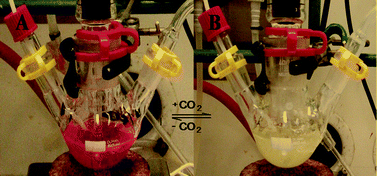Switchable Ionic liquids (SILs) based on glycerol and acid gases
Abstract
New types of switchable

* Corresponding authors
a
Laboratory of Industrial Chemistry and Reaction Engineering, Process Chemistry Centre, Åbo Akademi University, Åbo-Turku, FI-20500, Finland
E-mail:
ianugwom@abo.fi
Fax: +35822154479
Tel: +35822154514
b
Technical Chemistry, Department of Chemistry, Chemical-Biological Center, Umea University, SE-901 87, Umea, Sweden
E-mail:
Jyri-Pekka.Mikkola@chem.umu.se
Fax: +46 (0)90-13 63 10
Tel: +46 (0)90-786 5284
c Laboratory of Organic Chemistry, Åbo Akademi University, Åbo-Turku, FI-20500, Finland
d Laboratory of Analytical Chemistry, Åbo Akademi University, Process Chemistry Centre, Åbo-Turku, FI-20500, Finland
New types of switchable

 Please wait while we load your content...
Something went wrong. Try again?
Please wait while we load your content...
Something went wrong. Try again?
I. Anugwom, P. Mäki-Arvela, P. Virtanen, P. Damlin, R. Sjöholm and J. Mikkola, RSC Adv., 2011, 1, 452 DOI: 10.1039/C1RA00154J
To request permission to reproduce material from this article, please go to the Copyright Clearance Center request page.
If you are an author contributing to an RSC publication, you do not need to request permission provided correct acknowledgement is given.
If you are the author of this article, you do not need to request permission to reproduce figures and diagrams provided correct acknowledgement is given. If you want to reproduce the whole article in a third-party publication (excluding your thesis/dissertation for which permission is not required) please go to the Copyright Clearance Center request page.
Read more about how to correctly acknowledge RSC content.
 Fetching data from CrossRef.
Fetching data from CrossRef.
This may take some time to load.
Loading related content
